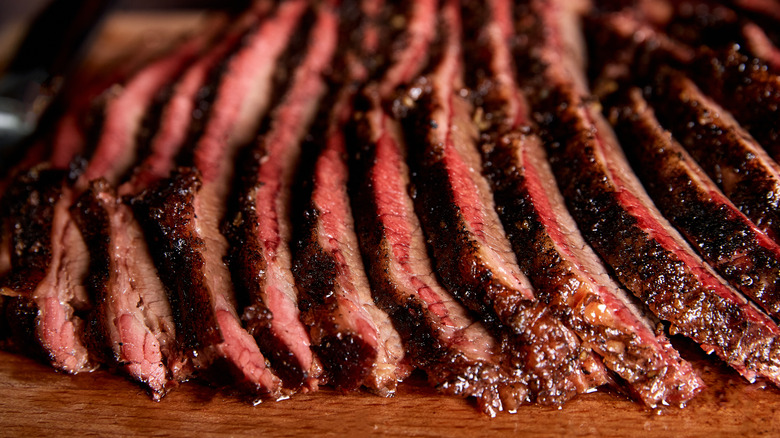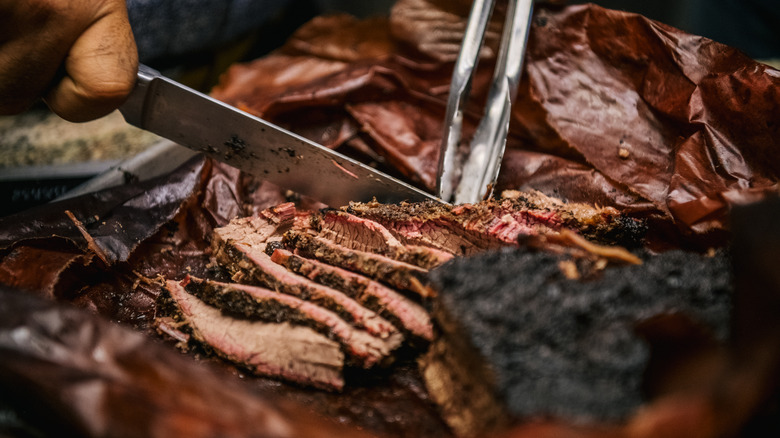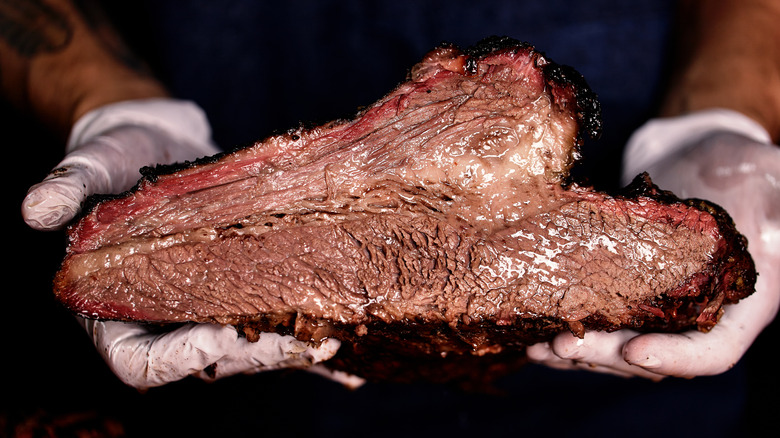We Know It's Tempting, But You Shouldn't Cook Brisket On The Grill
When it comes to cooking a big slab of meat, most people think that putting it on the grill is the best option. Not only does a grill provide you with an extra large cooking surface, but it also gives the meat a distinct smokey flavor you can really only get through grilling. This flavor develops through a continuous cycle in which meat juices drip through the grill, get absorbed by charcoal or wood, then subsequently heat the meat. In the process, the Maillard reaction also occurs, during which the amino acids in the meat protein react, brown, and produce flavor.
Cooking brisket on the grill is accompanied by this same series of events. But while the meat will technically have plenty of flavor, it won't be enough to compensate for the texture. Even if it isn't cooked to well-done, grilled brisket will still almost always turn out extremely tough. It's best therefore to save the grill for other cuts of meat.
Why brisket doesn't get tender on the grill
The Maillard reaction isn't the only chemical reaction that occurs when you grill meat. Heat also causes the muscle fibers to tighten, while the fat within these muscle fibers breaks down. As a result of these reactions, the meat develops a new texture. While brisket contains a considerable amount of fat, it still turns out tough when you grill it. This is due to the natural properties of the muscle that make up brisket.
Brisket meat comes from the pectoral muscle of the cow. Because of its anatomical function, the pectoral muscle contains more connective tissue and therefore more collagen compared to other parts of the cow. The more collagen in a cut of meat, the longer it takes to tenderize. The good news is, collagen plus heat equals gelatin. However, in order for collagen to actually turn into gelatin, it has to remain at 160–205 degrees Fahrenheit for an extended period, usually several hours. That can't happen on a grill, where the temperature is higher and the cooking time is shorter.
Best ways to cook brisket
Since tender brisket is the result of the collagen turning to gelatin, using the grill isn't the best course of action. Instead, the best way to cook this cut of meat is either in the oven or in a smoker, where you can get precise with the temperature. To cook brisket in the oven, place the meat in a Dutch oven or aluminum foil-covered baking dish, then set the temperature to 225 degrees Fahrenheit. Within about three hours it should be done. Cooking it in a smoker will take longer, between seven and 10 hours. For best results, set your smoker to 200–250 degrees Fahrenheit, turning the brisket and coals or wood every so often.
Keep in mind that time isn't the most reliable indicator of doneness when cooking brisket. Because it varies greatly depending on the thickness and size of the meat, you'll want to rely primarily on the internal temperature of the meat instead. As soon as it hits 150 degrees Fahrenheit, it's safe to pull it out of the smoker or oven. You can keep it in longer, but for the most tender results, don't let the temperature of the brisket rise any higher than 170 degrees Fahrenheit. It'll take a few hours, but it will definitely be worth the wait. So ditch the grill when it comes to brisket; this is an occasion where slow and steady is the way to go.


